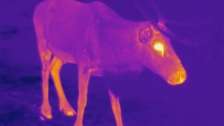Rudolph the red-nosed reindeer had a very shiny nose, goes the holiday classic. And now, a Lund University research team in Sweden has captured the phenomenon with a thermographic camera.
The video footage was filmed at the Zoo of Nordic Animals in Sweden, the world's largest zoo for Nordic animals.
Dutch and Norwegian researchers have previously discovered why Rudolph's nose is red, describing a rich supply of blood to the reindeer mule to keep it from freezing.
Lund University in Sweden has now taken it a step further, creating an entire research group dedicated to mammals and their noses.
"When reindeer are feeding, their mules are exposed to very low temperatures as they look for food under the snow. They need to maintain sensitivity in order to know what they're actually eating", explains Ronald Kröger, Professor of Functional Zoology at Lund University. This means reindeer pump warm blood into the nose in cold weather, possibly creating a reddish "glow".
However, not all mammals function this way. Kröger, a dog owner, was playing with his dog one day when he suddenly wondered why dogs were "the odd mammal out" – why was his dog's nose cold?
This sparked the creation of the Mammalian Rhinarium Group at Lund University, which studies how mammals obtain sensory information from their specialized, hairless and wet nose tips called rhinaria.
"Dogs are the exact opposite to reindeer. Nobody knows why their noses are cold and why they have evolved that way. That is what we want to find out", concludes Ronald Kröger.
Provided by Lund University





















